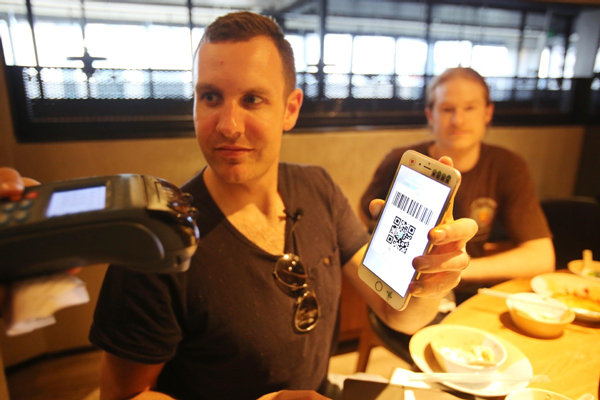Apps simplify expense steps for foreign users

A foreign resident uses a mobile payment app at a restaurant in Hangzhou, Zhejiang province. [Photo/China Daily]
Chinese mobile payment service providers are making it easier for overseas visitors to pay for their daily purchases online, as part of a broader drive by the nation to improve the payment experiences of foreigners.
Alipay, the digital payment arm of Chinese financial technology company Ant Group, has boosted resources to ensure foreigners in China can use mobile payments without any hurdles by rolling out translation services for 16 languages recently.
Data from Alipay showed that the transaction volume of foreign visitors who pay through the mobile payment app surged nearly 10 times year-on-year in March, with the number of active users skyrocketing nearly six-fold during this period from a year earlier.
Alipay allows foreigners in China to link their international bank cards, including Visa, Mastercard, JCB and Discover Global Network, to its mobile payment tool, greatly streamlining the payment process, said Zhu Xugang, director of cross-border business at Ant Group.
The newly launched multilingual app includes English, French, Spanish, German, Italian, Portuguese, Russian, Japanese, Thai, and Vietnamese, he added. Users can leave voice messages or input texts to translate between different languages.
Users of 11 overseas e-wallets will also be able to use their familiar home e-wallets on their own phones by scanning Alipay QR codes, to enjoy a seamless mobile payment experience across Alipay's vast merchant network.
According to Alipay, foreigners can use the app to complete payments at restaurants, hotels, scenic spots, convenience stores and supermarkets, as well as for ride-hailing, shared bikes, buses and other public transportation services in China.
The State Council, China's Cabinet, published in March a guideline on improving payment services and enhancing payment convenience, so as to better meet the diversified payment needs of the elderly and foreign visitors.
The People's Bank of China, the country's central bank, has released a payment guide that provides foreigners with text and graphic instructions on using bank cards, cash, mobile payments and e-CNY in China, the latest step in the country's push to optimize the payment experience for foreigners.
According to the payment guide, no IDs are required for transactions below a certain threshold when foreign visitors use mobile payment services such as Alipay, Weixin Pay and UnionPay, and some international e-wallets will be accepted by merchants in China.
Both Alipay and Weixin Pay, a mobile payment service within the Weixin app designed for users on the Chinese mainland, have raised the limit of single mobile payment transactions for foreigners in China from $1,000 to $5,000 and lifted the annual cumulative transaction limit to $50,000 from $10,000 earlier.
Tech giant Tencent Holdings is working to help foreign visitors make small-ticket payments through Weixin Pay without the need to link their international bank cards. Users can also try Weixin Pay first without submitting full identity information after binding a bank card.
Tencent said the foreign card transaction volume has grown quickly. Compared with the trial period, transactions with foreign cards increased by nearly five times a day in February. More efforts will be made to further simplify the payment process for foreigners in the future, the company said.
Jennifer Anzora from El Salvador, who is in China for higher studies, said she just needs to download the Alipay app and bind it with her international cards.
She said the procedure is simple and that she uses Alipay on her mobile phone and Apple Watch for payments. Anzora also said she is able to buy products, book hotels, use ride-hailing services and order takeouts via Alipay.
"The latest moves to provide convenient payment services will not only significantly improve foreigners' living and consumption experiences in China, and attract more visitors, but also promote the healthy and sustainable development of the payment industry," said Wang Pengbo, a senior analyst at market consultancy Botong Analysys.
Wang said a series of measures, aimed at optimizing mobile payments for foreigners, demonstrate the country's resolve to expand high-standard opening-up.
He said the scope of binding foreign bank cards should be expanded and that the authentication of new users must be improved and simplified, in order to provide more convenient payment services for foreign visitors.
Dong Ximiao, chief researcher at Merchants Union Consumer Finance, said the inconvenience experienced by some foreign visitors can be mainly attributed to the differences in payment habits between China and other countries.
People in Europe, the United States and other developed economies are accustomed to using bank cards and cash for payments, and are not familiar with mobile payments, he said.
Dong said greater efforts are needed to expand the various types of payment methods at tourist attractions, sporting events, transportation hubs, healthcare and beauty centers and other daily consumption sites.





 play
play